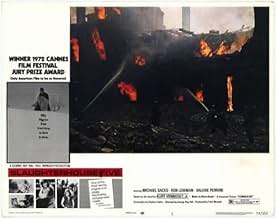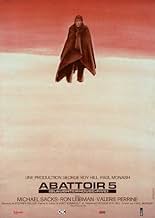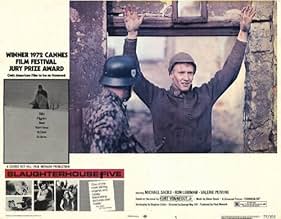बिली पिलग्रिम रहस्यमय ढंग से समय से अलग हो गया है। वह न्यूयॉर्क में अपने जन्म से लेकर एक दूर के ग्रह पर जीवन और फिर 1945 में ड्रेसडेन की आगजनी बमबारी की भयावहता तक, अनियंत्रित रूप से आगे-पीछ... सभी पढ़ेंबिली पिलग्रिम रहस्यमय ढंग से समय से अलग हो गया है। वह न्यूयॉर्क में अपने जन्म से लेकर एक दूर के ग्रह पर जीवन और फिर 1945 में ड्रेसडेन की आगजनी बमबारी की भयावहता तक, अनियंत्रित रूप से आगे-पीछे यात्रा करता है।बिली पिलग्रिम रहस्यमय ढंग से समय से अलग हो गया है। वह न्यूयॉर्क में अपने जन्म से लेकर एक दूर के ग्रह पर जीवन और फिर 1945 में ड्रेसडेन की आगजनी बमबारी की भयावहता तक, अनियंत्रित रूप से आगे-पीछे यात्रा करता है।
- पुरस्कार
- 3 जीत और कुल 4 नामांकन
- German Leader
- (as Friedrich Ledebur)
- Young German Guard
- (as Nick Belle)
फ़ीचर्ड समीक्षाएं
The book is also brilliant, but none of Vonnegut's work is easily adapted to the medium of film. Not quite the task Cronenberg took on when he directed Burrough's Naked Lunch, but very similar in method.
S-5 exposes us to the life of Billy Pilgrim (Michael Sacks) and his many loves (his dog spot, his wife played by Holly Near and an actress played by Valerie Perrine), as he either blacks out and travels into the deep recesses of his memory experiencing the delusion of time travel or (as indicated by his occasional leaps forward in time), he actually has become 'unstuck in time.' Between trips back to Dresden during its WWII bombing and trips forward to the planet Tralfamador, it seems that Billy is constantly tripping. Yet he manages to build a successful and very normal American life despite his bizarre and uncontrollable time-travel habit.
The film illustrates the non-linear manner in which the book is written by skipping from time to time in a seemingly random manner, but it manages to do so without losing focus on Pilgrim, who is, in fact always living in the present regardless of what time he happens to be experiencing. Fantastic directoral method!
The film makes a lot of subtle, simple and very good points by making Billy - a quiet simple guy with an extraordinary set of circumstances in his life - a true hero simply because he is relatively nice, somewhat aloof, happy, and quite normal. Sacks' performance is spot-on.
This film is beautifully photographed, very well paced, perfectly directed and edited. The acting is all quite good, and comes from a well appointed cast mostly consisting of character actors. I was particularly impressed with Eugene Roche's excellent portrayal of Edgar Derby.
Highly recommended for the art-house crowd and friends of intelligent sci fi.
Technically, the film uses the moments where Billy jumps in time as meaningful transitions. It interweaves lessons learned from one part of his life and applies it to the present moment (whenever that is). The film's real treasures are the supporting characters that surround Billy. It also vividly transports you to WW2, a semi-autobiographical account of Kurt Vonnegut's real life experiences in Dresden. The film is filled with anecdotes that present the film's other main theme, that life is indeed ironic.
I was deeply touched by this film, with it's ability to whisk you from scenes of horror to amusing 'Kodak moments'. The music poignantly represents these transitions, and helps to carry the film. In the end, you can accept his death, by having lived his life.
Hill won the best Director Oscar the next year with "The Sting". He later filmed the similarly unfilmable "World According To Garp" and also did a brilliant job with it, partially by letting go of John Irving's more depressing side. Other notable credits include Butch Cassidy... and The Great Waldo Pepper.
Michael Sacks, in his first movie, and only starring role at the tender age of 24, is completely convincing and natural. He is equally effective, compelling, and believable at the six distinct stages of Pilgrim's life memorialized herein. If he weren't up to the six-in-one role, the film wouldn't work, but he is, and it does. (I wonder why he has no other major credits, and ceased acting altogether in 1984. If anyone knows, please e-mail me.)
Valerie Perrine is fine as Montana Wildhack. The other characters are all played for maximum irony and effect, and the cast delivers beautifully, without exception. Eugene Roche is the epitome of kindness as Edgar Derby, the yin, to Ron Liebman's yang, a twisted ball of anger named Paul Lazaro. John Dehner is brilliant as a war-hawk professor upset at the Vietnam protesters. His character would be as appropriate amidst today's global conflagration as it was in 1966. Lucille Benson, Kevin Conway, Sorrell Booke, Holly Near, Richard Schaal, and Perry King are the more familiar names in a uniformly excellent cast, including the German actors.
The musical score is also perfect, both in tone and substance. Vonnegut is a master of superimposing satire over irony over futility. The movie does a marvelous job of blending these contrasts and making its audience feel enriched. The music underscores all of these contrasts. The cinematography also is magnificent.
Searching desperately for something to say to show that the movie cannot be 100% perfect, the only thing I can come up with is that the pacing of the movie drags slightly when the soldiers leave the first camp for Dresdner until their new Kommandant gives his "welcoming" speech. It might have played better with about three minutes cut from that sequence. So what?
I recently saw Slaughterhouse Five for the fifth time in 27 years since I originally saw it at my college campus -- this time on DVD. I never fail to catch something new, and I never fail to enjoy it all the more.
Given how many 70's movies have failed miserably to withstand the test of time, Slaughterhouse Five is a true treat to be savored.
Let me safely say that Kurt Vonneguts 'Slaughterhouse 5' is my favourite book ever. It is incredibly funny and moving above any book I've ever read. But it is also a very complex and philosophical story with many deeply rooted undertones. As such, I strongly urge people to READ THE BOOK before you see this movie. A great many points are left unexplained to the viewer, assuming they have read Vonneguts version. As I read it beforehand, the movie didn't insult my intelligence by putting Vonneguts ideas in plain view. Instead, it relies faithfully on the viewers interpretations, not unlike the book.
Once again, unless you have a mind open like a 7-11, READ THE BOOK. Take my advice, and be immersed in the greatest story of the 20th century.
क्या आपको पता है
- ट्रिवियाAlthough Kurt Vonnegut Jr.'s renowned refrain, "And so it goes", appears over 100 times in the novel, it it is not uttered even once in this film.
- गूफ़When Billy Pilgrim is asked by the American soldiers, "Where's your rifle?", he replies that he doesn't have one because he's a chaplain's assistant. However, in the United States Army, the primary duty of the chaplain's assistant in a combat zone is to protect the chaplain, so all chaplain's assistants must carry rifles. Because Chaplains are considered ministers in uniform they are forbidden from carrying weapons even when in combat zone.
- भाव
Billy Pilgrim: [in his sleep] You guys go on without me. I'll be alright.
Prof. Rumfoord: All he does in his sleep is quit, surrender, and apologize. I could carve a better man out of a banana.
- साउंडट्रैकConcerto No. 5 for Harpsichord in F minor, BWV 1056 - 2nd movement 'Largo'
Written by Johann Sebastian Bach (as J.S. Bach)
Performed by Glenn Gould, Piano
Columbia Symphony Orchestra
Vladimir Goldschmann, Conductor
टॉप पसंद
- How long is Slaughterhouse-Five?Alexa द्वारा संचालित
विवरण
- रिलीज़ की तारीख़
- कंट्री ऑफ़ ओरिजिन
- आधिकारिक साइटें
- भाषाएं
- इस रूप में भी जाना जाता है
- Schlachthof 5
- फ़िल्माने की जगहें
- प्राग, चेक गणराज्य(as Dresden)
- उत्पादन कंपनी
- IMDbPro पर और कंपनी क्रेडिट देखें
बॉक्स ऑफ़िस
- बजट
- $32,00,000(अनुमानित)
- चलने की अवधि
- 1 घं 44 मि(104 min)
- ध्वनि मिश्रण
- पक्ष अनुपात
- 1.85 : 1





































